John Stuart Mill Quotes
Most popular John Stuart Mill Quotes

All good things which exist are the fruits of originality.
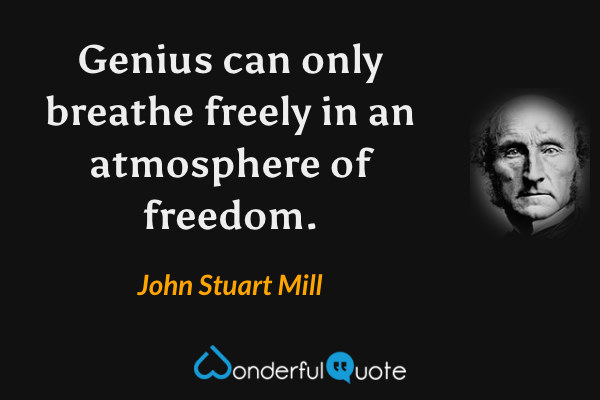
Genius can only breathe freely in an atmosphere of freedom.

Ask yourself whether you are happy, and you cease to be so.

There is always hope when people are forced to listen to both sides.
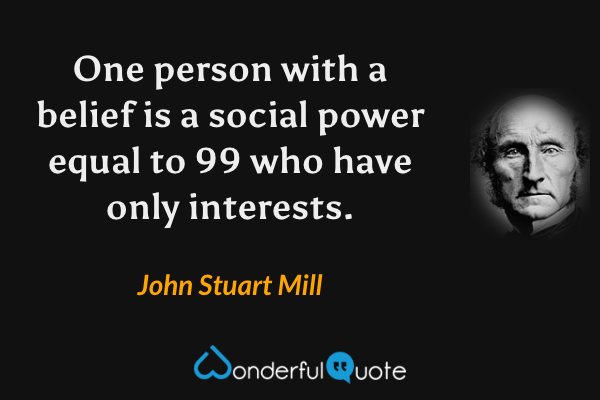
One person with a belief is a social power equal to 99 who have only interests.

The despotism of custom is everywhere the standing hindrance to human advancement.

Conservatives are not necessarily stupid, but most stupid people are conservatives.

Men might as well be imprisoned as excluded from the means of earning their own bread.
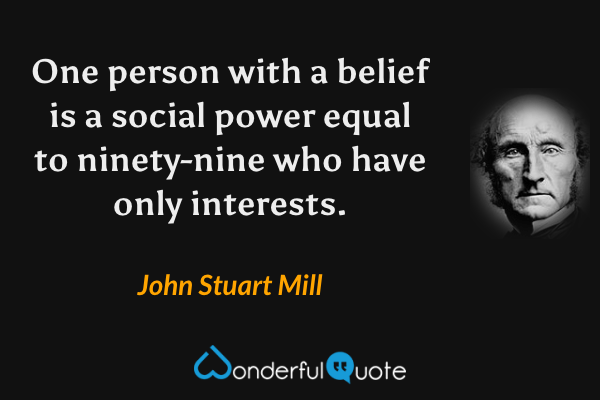
One person with a belief is a social power equal to ninety-nine who have only interests.

Bad men need nothing more to compass their ends, than that good men should look on and do nothing.

There is nothing which spreads more contagiously from teacher to pupil than elevation of sentiment.

I have learned to seek my happiness by limiting my desires, rather than in attempting to satisfy them.
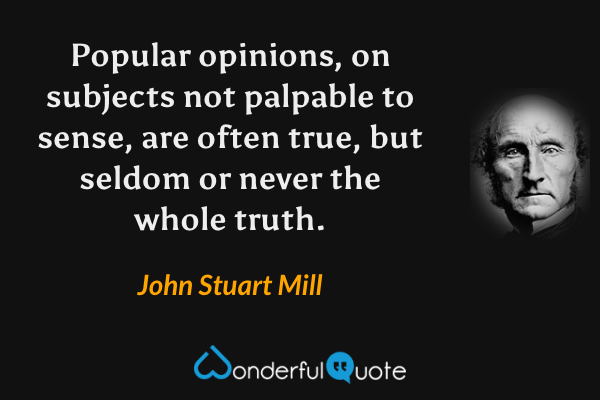
Popular opinions, on subjects not palpable to sense, are often true, but seldom or never the whole truth.

The exclusive pretension made by a part of the truth to be the whole, must and ought to be protested against.

It is questionable if all the mechanical inventions yet made have lightened the day's toil of any human being.

There is no such thing as absolute certainty, but there is assurance sufficient for the purposes of human life.

There are many truths of which the full meaning cannot be realized until personal experience has brought it home.

Marriage is the only actual bondage known to our law. There remain no legal slaves, except the mistress of every house.

The fatal tendency of mankind to leave off thinking about a thing when it is no longer doubtful is the cause of half their errors.

A stupid person's notions and feelings may confidently be inferred from those which prevail in the circle by which the person is surrounded.

The amount of eccentricity in a society has generally been proportional to the amount of genius, mental vigor, and moral courage it contained.

We can never be sure that the opinion we are endeavoring to stifle is a false opinion; and if we were sure, stifling it would be an evil still.

A person may cause evil to others not only by his actions but by his inaction, and in either case he is justly accountable to them for the injury.
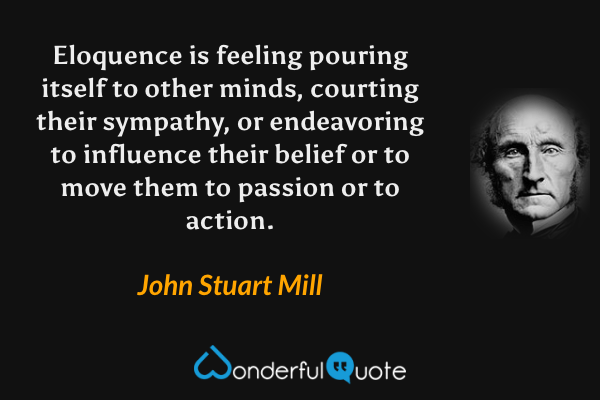
Eloquence is feeling pouring itself to other minds, courting their sympathy, or endeavoring to influence their belief or to move them to passion or to action.

War is an ugly thing, but not the ugliest of things; the decayed and degraded state of moral and patriotic feeling which thinks nothing worth a war, is worse.

In proportion to the development of his individuality, each person becomes more valuable to himself, and is therefore capable of being more valuable to others.

Whatever crushes individuality is despotism, by whatever name it may be called, and whether it professes to be enforcing the will of God or the injunctions of men.
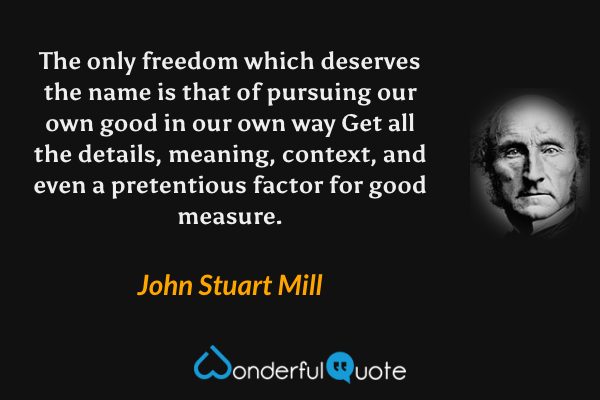
The only freedom which deserves the name is that of pursuing our own good in our own way Get all the details, meaning, context, and even a pretentious factor for good measure.
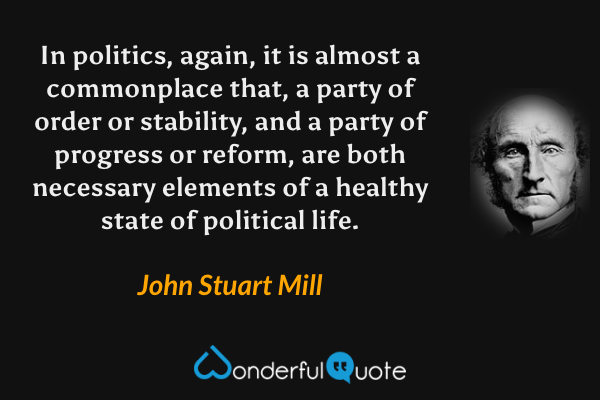
In politics, again, it is almost a commonplace that, a party of order or stability, and a party of progress or reform, are both necessary elements of a healthy state of political life.

As for charity, it is a matter in which the immediate effect on the persons directly concerned, and the ultimate consequence to the general good, are apt to be at complete war with one another.
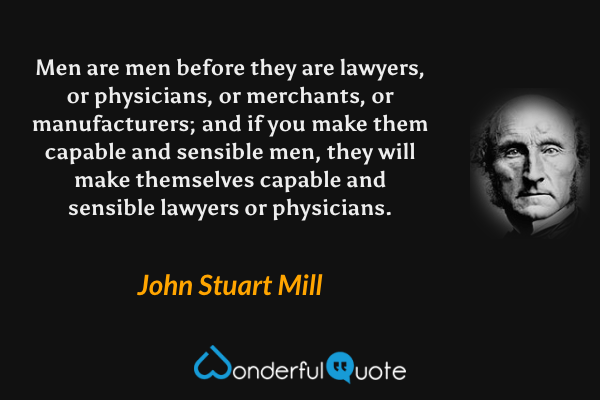
Men are men before they are lawyers, or physicians, or merchants, or manufacturers; and if you make them capable and sensible men, they will make themselves capable and sensible lawyers or physicians.

As long as justice and injustice have not terminated their ever renewing fight for ascendancy in the affairs of mankind, human beings must be willing, when need is, to do battle for the one against the other.

In the golden rule of Jesus of Nazareth, we read the complete spirit of the ethics of utility. To do as you would be done by, and to love your neighbor as yourself, constitute the ideal perfection of utilitarian morality.

Eccentricity has always abounded when and where strength of character had abounded; and the amount of eccentricity in a society has generally been proportional to the amount of genius, mental vigor, and courage which it contained.

If all mankind minus one were of one opinion, and only one person were of the contrary opinion, mankind would be no more justified in silencing that one person, than he, if he had the power, would be justified in silencing mankind.

Poetry and eloquence are both alike expression or utterance of feeling. But if we may be excused the antithesis, we should say that eloquence is heard, poetry is overheard. Eloquence supposes an audience; the peculiarity of poetry appears to us to lie in the poet's utter unconsciousness of a listener.
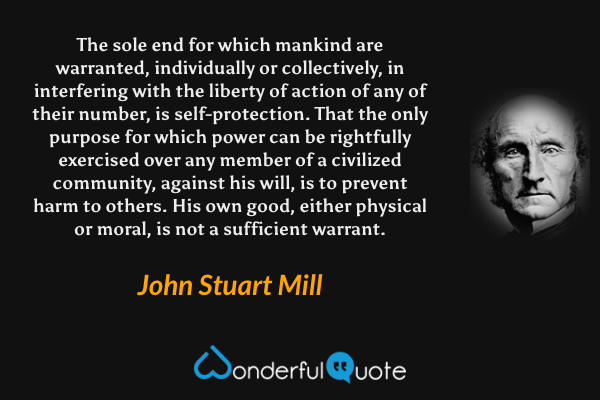
The sole end for which mankind are warranted, individually or collectively, in interfering with the liberty of action of any of their number, is self-protection. That the only purpose for which power can be rightfully exercised over any member of a civilized community, against his will, is to prevent harm to others. His own good, either physical or moral, is not a sufficient warrant.
Poetry and eloquence are both alike expression or utterance of feeling. But if we may be excused the antithesis, we should say that eloquence is heard, poetry is overheard.
The amount of eccentricity in a society has generally been proportional to the amount of genius, mental vigor, and moral courage it contained. That so few now dare to be eccentric marks the chief danger of the time.
There is nothing which spreads more contagiously from teacher to pupil than elevation of sentiment. Often and often have students caught from the living influence of a professor a contempt for mean and selfish objects, and a noble ambition to leave the world better than they found it; which they have carried with them throughout life.


